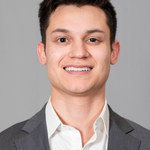2025 ASCO Award Recipients: Teresia Perkins and Mathew Krick
Congratulations to Teresia Perkins and Mathew Krick, this year’s 2025 ASCO Grant Award recipients! Teresia and Mathew received the Medical Student Rotation (MSR) which provides support for clinical or clinical research oncology rotations to medical students interested in pursuing oncology as a career. Learn more about their projects and inspiration behind them below.
Teresia Perkins’ Project
Project Title: Examining Depression and Anxiety Among Non-English-Speaking Prostate Cancer Patients Undergoing Radiation Therapy

Teresia’s project explores how language barriers influence health outcomes, uncovering disparities beyond basic access to cancer treatment. Experiencing healthcare disparities firsthand—including losing her brother to inadequate care—ignited her passion for medicine and empathy for underserved patients. In this project, Teresia strives to address overlooked factors that significantly affect prostate cancer outcomes. This work is crucial, timely, and targets disparities exacerbated by language barriers and cultural stigma surrounding mental health. Revealing these hidden challenges will guide interventions to enhance care for vulnerable patient populations.
Teresia is profoundly grateful to her mentor Dr. Ariel Hirsch; her fellow BU students who have facilitated this study from inception; the entire BMC RadOnc team; the Boston University Chobanian & Avedisian School of Medicine research community; and the American Society of Clinical Oncology for their invaluable guidance and support throughout this transformative research journey.
Mathew Krick’s Project
Project Title: Treatment Delays and Ultrasonography Findings in Uveal Melanoma
 Mathew’s project examines how treatment delays impact uveal melanoma (ocular melanoma) tumor growth over time. It will take place at the University of California, Los Angeles’ department of ocular oncology. “Obstacles to prompt care and treatment delays are often impacted by social determinants of health and structural factors. My project will not only provide insight into the rate of uveal melanoma growth in a cohort of patients but will also shed light on how structural factors, such as insurance barriers, affect how quickly patients can be admitted for surgery and radiation therapy,” Krick explains.
Mathew’s project examines how treatment delays impact uveal melanoma (ocular melanoma) tumor growth over time. It will take place at the University of California, Los Angeles’ department of ocular oncology. “Obstacles to prompt care and treatment delays are often impacted by social determinants of health and structural factors. My project will not only provide insight into the rate of uveal melanoma growth in a cohort of patients but will also shed light on how structural factors, such as insurance barriers, affect how quickly patients can be admitted for surgery and radiation therapy,” Krick explains.